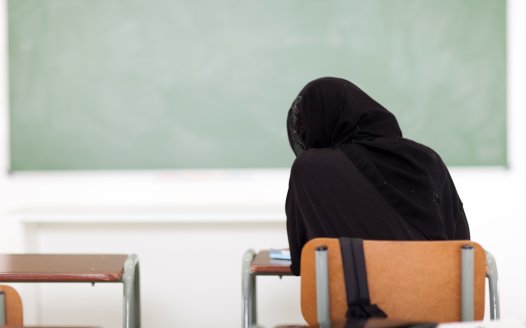Separate is not equal – not in this ‘faith’ school
Posted: Tue, 11th Jul 2017 by Stephen Evans
Turning a blind eye to discriminatory gender discrimination in Islamic schools would be disaster for future generations of British girls growing up in Muslim communities, argues Stephen Evans.
I was in court this week for Ofsted's appeal of a ruling that gender segregation in a state-funded Islamic state school is not discriminatory.
The publicly funded Al-Hijrah Islamic faith school in Birmingham was inspected by Ofsted last summer, following a visit from the former chief inspector Sir Michael Wilshaw in June.
Sir Michael was said to have expressed "firmly negative views about the practice of segregation" at the school during his visit and ordered an immediate inspection.
In addition to finding girls and boys completely segregated in what purported to be a 'mixed school', inspectors also found books in its library which "included derogatory comments about, and the incitement of violence towards, women".
Discussing the books' content in his ruling, the judge said: "one of the books states that a wife is not allowed to refuse sex to her husband. Another opines that women are commanded to obey their husbands and fulfil their domestic duties. Two books made clear that a husband may in certain circumstances beat his wife, provided that this is not done 'harshly'."
Some girls complained anonymously that gender segregation did not prepare them for social interaction and integration into the wider society.
Nevertheless, the judge determined that the segregation practised within the school did not result in "one sex being treated less favourably than the other."
Mr Justice Jay said Ofsted inspectors wrongly assumed that the gender segregation implied unequal treatment and said its inspection report was based on the erroneous view that the school had committed unlawful sex discrimination.
The law permits only the most limited differences of treatment between pupils based on gender. There is a specific exemption in the Equality Act 2010 that allows single sex schools to have sex or gender specific admissions policies. There is however no statutory sanction against enforced segregation on the same school premises, whether for religious or other reasons. As vesitages of Victorian era gender segregation in education faded away, perhaps nobody thought this would be an issue in modern Britain.
But after considering the facts of this particular case – not least the "very prominently" displayed books in the library – it's hard to understand how one can fail to see the way in which the separation of the sexes in this school indicated an inferior outlook on women that reinforced notions of inferiority.
Of course there will be limited circumstances where it is reasonable to separate girls and boys in educational settings. But context matters. And we cannot ignore the fact that under some interpretations and manifestations of Islam, Muslim women are certainly not treated as men's equals.
Defenders of segregation may well stress the educational advantages of segregating pupils. And it is true that some educationalists believe that girls and boys perform better in single sex environments.
But this is a school that had books in its library that condoned rape and violence against women. A school where inherently misogynistic 'modesty' codes are enforced on young girls, forcing female pupils to 'cover up'. A school that applies a regime of "complete segregation" for all lessons, breaks, school clubs and trips. A school in which "teaching and learning in all subjects is Islamised".
You may believe that the school is acting in the best educational interests of the female pupils, but forgive me if I just don't buy it.
Another person not buying it is human rights campaigner Maryam Namazie. As she puts it:
"Girls in Islamic schools are segregated not in order to enable them to flourish but because they are seen to be the source of fitnah and male arousal from puberty onwards. Which is why they must be veiled, segregated, and prevented from many activities that are essential to child development. The court would do well to remember that when it comes to children in particular, there is a duty of care to ensure that the girl child has access to a level playing field and is able to flourish – sometimes despite the wishes of parents and fundamentalists."
Others not buying it include women's rights campaigners Southall Black Sisters and the counter-extremism and human rights organisation, Inspire – led by Sara Khan, a British Muslim woman on a mission to empower Muslim women to challenge the inequalities facing them.
The two groups have intervened in the case to ensure the court considers what is at stake here – especially for minority women and girls.
In the context of this school, separate is not equal. We wouldn't dream of regarding racial or sexual orientation separation in the classroom as legitimate – we wouldn't even be having the conversation – let's not lower the bar for gender segregation in order to accommodate religious customs and practices.
As their intervention will make clear, "the growing practice of gender segregation in education is not a benign development. It has a social and political history that can be traced back to the Rushdie Affair when religious fundamentalists sensed an opportunity to seize education as a battleground and a site on which to expand their influence."
Perhaps just as troubling as the current ruling is Ofsted's refusal to argue in court that the reason for segregating in this way was that the school's religious ethos viewed girls as inferior. It is inconceivable from what Ofsted acknowledges having observed at the school that they cannot have realised this.
The interveners were denied the opportunity to make an oral statement in court, but thanks to the intervention, these arguments will now be considered as part of the appeal.
As the intervening groups have warned, "Ultra-conservative and fundamentalist gender norms are seeping into the everyday life of minority communities".
UK law must protect young girls from 'educators' who seek to treat them as second-class citizens, yet this case risks becoming a precedent for the segregators.
It's shameful that our education system allows and encourages the religious segregation of pupils in the first place. To allow such gender segregation within those faith schools would be even more egregious – and a disaster for future generations of British girls growing up in Muslim communities.








